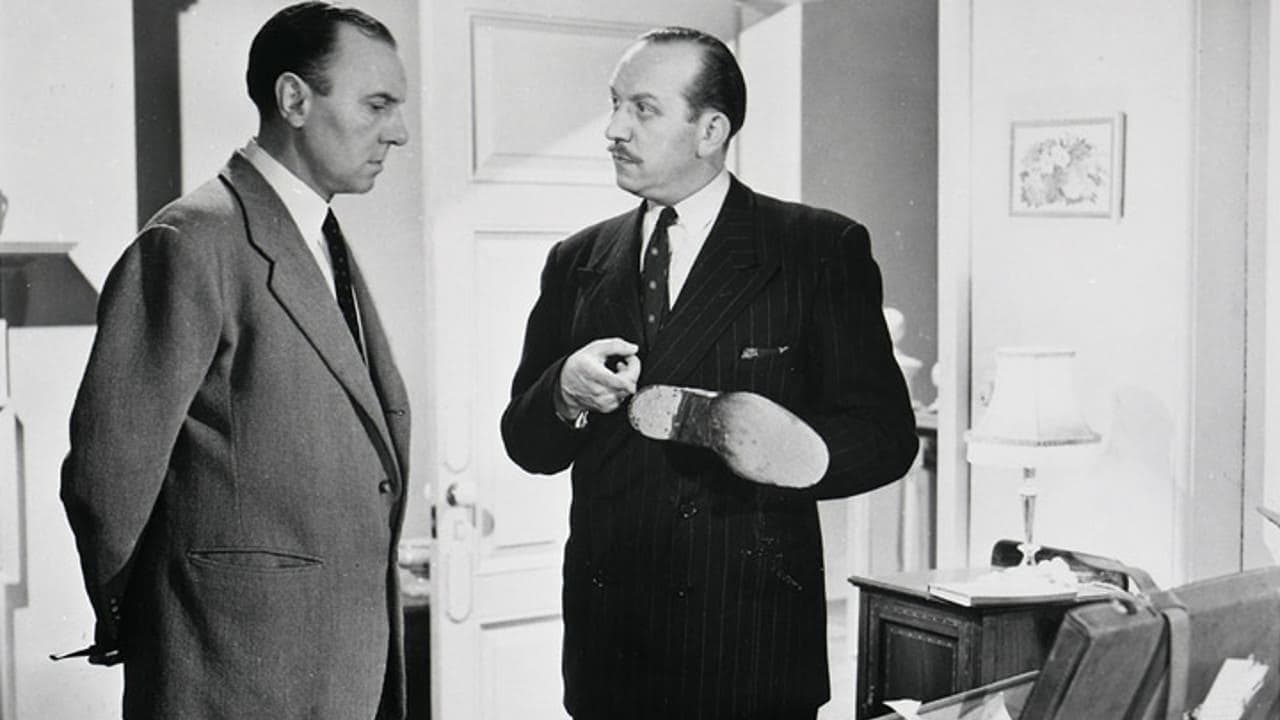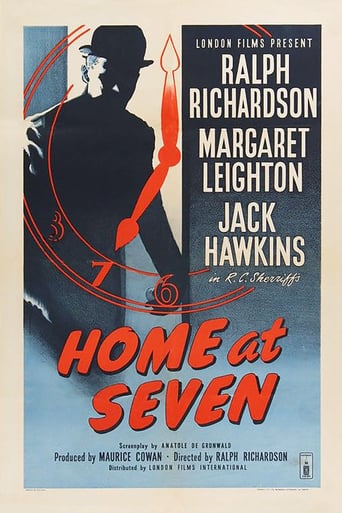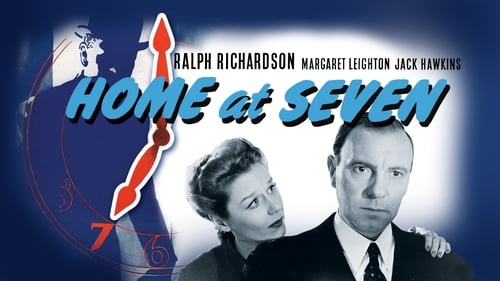


Pretty good movie overall. First half was nothing special but it got better as it went along.
... View MoreIf you're interested in the topic at hand, you should just watch it and judge yourself because the reviews have gone very biased by people that didn't even watch it and just hate (or love) the creator. I liked it, it was well written, narrated, and directed and it was about a topic that interests me.
... View MoreA great movie, one of the best of this year. There was a bit of confusion at one point in the plot, but nothing serious.
... View MoreThe movie really just wants to entertain people.
... View MoreYet again Network do movie buffs a favour with the re release of what was, at the time, a main feature and the fact that it came and went without causing a stir says much about the early fifties and I think the farm is safe when I bet it that dozens of movies released around the same time to acres of newsprint are unwatchable today whilst Home At Seven proves very durable. It's a great pity that Ralph Richardson didn't direct himself more on film as he shows the vastly overrated Laurence Olivier how it should be done. With a sound basis in the theatre this engaging 'well-made play' by R.C. Sheriff is an excellent vehicle for Richardson who never puts a foot wrong as a victim of temporary amnesia who 'loses' a full twenty-four hours of his hum-drum life completely unaware - and very plausibly. In real life of course this would be distressing at worst but because this is real life heightened by a dramatist a certain spin is applied via the coincidental murder of a man openly despised by Richardson plus the theft of money for which Richardson, as Treasurer of a local club, has responsibility. Needless to say the matter is resolved happily but not before offering a time-capsule of a way of life now as remote as Atlantis.
... View MoreI wonder how much dialogue you can squeeze into an 80 minute movie. "Home At Seven" tries its darnedest to break the record, in a film that is long on discussions but short on action.It starts with a great idea. A man comes home from work, to discover that he has missed an entire day, during which a murder has been committed. So far, so good. But I found out that it is almost possible to talk a good idea to death, as there follows an endless collection of discussions, confrontations, meetings and heart to heart talks. Now, I understand that in such a situation explanations must be in order, but the whole movie began to seem like a 3 hour ordeal.Ralph Richardson is the hapless husband and Margaret Leighton is wonderful as his devoted wife. Jack Hawkins is their doctor-friend and all three principals try their best to move things along. Granted, it is a clever concept and ultimately brought to a surprise ending, but it's not a good sign when you keep checking your watch throughout the picture.But it is well worth a look, especially if you have more patience than myself.
... View MoreThis is certainly one of the most accurate portrayals on film of what psychologists call a 'fugue state', which is a dissociative disorder of human consciousness caused by a mental trauma. In this story, a perfectly ordinary bank executive played by Ralph Richardson experiences amnesia for a 24-hour period of his life, with disastrous consequences. Every evening, after leaving his job in the City of London, Richardson takes the train from Cannon Street Station and arrives home in the suburbs at seven. One Tuesday, he arrives home at seven to find his wife, played brilliantly by Margaret Leighton, in a terrible state of anxiety bordering on hysteria. She asks him where he has been, why he did not come home the night before, why was he not at work at the bank all day, and she informs him that she called the police and reported him missing. He is incredulous and says that she is talking nonsense, that here he is precisely at seven as always, and it is Monday, not Tuesday. But she shows him the newspaper and proves that it is really Tuesday. Thus the story begins, and everything becomes increasingly desperate and harrowing from there on. This is the first and only film directed by Ralph Richardson, and he has done a superb job of it. He received expert support from cameramen Jack Hildyard and Ted Scaife, with camera operator Denys Coop, and Assistant Director Guy Hamilton, all of whom later became famous. Although the film is not showy and does not have dramatic lighting and editing, the emphasis is on the story and the actors, which creates a considerable intensity, as the performances are all so good. The doctor who attempts to sort out Richardson's 'missing day' is expertly played by Jack Hawkins, who was always one of the most reliable as well as agreeable of British actors, whether as a lead or in a supporting role, as here. The reason why this film is so convincing and so accurate in its portrayal of this psychological condition is that it is based upon a play by R. C. Sheriff. Sheriff is chiefly famous for his play JOURNEY'S END, which was filmed in 1930 and subsequently three more times. It is a gripping film about the trenches of the First World War, based on Sheriff's own Army experiences prior to his being invalided out after the Battle of Ypres. (It is a superb film. I taped it off the air years ago but gave my tape to John Mills, who asked me for it because he wanted to see it again, as he had been touring in that play as a young man when he met his wife in Shanghai because she and her father Colonel Hayley Bell attended a performance, and it was love at first sight. He thus considered that in a way he owed his happy marriage to R. C. Sheriff.) Sheriff had a direct and personal experience of such matters as shell shock and the fugue states caused by battle trauma, which he put to good use in HOME AT SEVEN, since the explanation of Richardson's fugue state is eventually found to be because he heard a sound like a gunshot, which snapped him into a dissociative state where he imagined he was again under attack in the War. The story was filmed again for television by the BBC five years later, in 1957, with Peter Cushing in the lead. Sheriff's expertise at writing convincing stories about strange mental states was shown in the film THE NIGHT MY NUMBER CAME UP (1955). That is a film I know a great deal about indeed, as it is based upon a real paranormal experience of my close friend Air Marshal Sir Victor Goddard (who made a speech at my wedding), with whom I discussed both the experience and the film on many occasions. Sir Victor believed Sheriff had done a very good job of portraying his story in dramatic form, and that was Sheriff's great strength. He also wrote the famous ODD MAN OUT (1947) with James Mason, and he adapted the two excellent Somerset Maugham story compilation films, QUARTET (1948) and TRIO (1950). And of course he did the screenplays for the classics THE INVISIBLE MAN (1933), GOODBYE, MR. CHIPS (1939), and THE DAM BUSTERS (1955). He really was a giant of British stage and screen, and deserves to be better remembered. He died in 1975. This film does a first rate job of putting the story across, in a state of high anxiety and suspense. It turns out that for all the years of his marriage, Richardson had been telling a little white lie to his wife by saying he left work at 6, whereas he really left work at 5 and stopped off in the back room of a pub run by friends (as pubs only opened at 6) for a friendly and very tame sherry, and a game of darts. He didn't care to tell his wife lest he offend her, as she 'disapproved of alcoholic drinks'. This is Richardson's one guilty secret, surely the tamest one ever featuring as a major plot element in a suspense film! But because of it, no one can figure out where Richardson was for his 24 lost hours, and he is wrongly suspected of theft and murder. This film should be shown to psychology students at universities. I have made a considerable study of dissociative psychological states, and I can assure everyone that every detail of this film is accurate, clearly because it is based upon a real case or cases known to Sheriff, and possibly even others known to Richardson, thus perhaps explaining Richardson's strange enthusiasm for the story. It is always better when films about psychological cases such as amnesia and dissociation of personality are based upon facts, for then they are convincing and effective, as this is.
... View MoreMany seem to dismiss this movie as a mild matinée entertainment. I found it very unsettling as the story deliberately starts with a normal, boring situation only to depart from normality in an abrupt and disturbing way to offer a glare into the abyss of the human psyche. The first two or three minutes the viewer is given time to settle down for something that looks like a comedy. A cheerful caricature of a meek office clerk (Ralph Richardson) comes home. He meets his wife desperate, she tells him he has disappeared for 24 hours. The clerk is not aware of that.Now, this is a standard situation for a comedy. But in this movie the couple in question is simply shattered. Time you cannot account for is regarded by them as abnormal, a potential sin. Distrust arises, the wife distrusts her husband and, what's worse, the husband distrusts himself. The situation gets worse when the clerk learns that a member of a club he belongs to was murdered during the time in question. In desperation he goes to see a doctor (Jack Hawkins) and tells him of his memory loss and the murder. He also tells him that he thinks he might have committed the murder. As the doctor tries to laugh that off the clerk says: But I absolutely hated that man. He does that with an unexpected vehemence that it really made me jump.The riddle can be solved and the story has a happy ending. The clerk's amnesia was caused by subconscious memories of bombing raids, a backfiring car made him go into shock for 24 hours, luckily in a safe place" (a pub). As a matter of fact, the discovery of this hidden vulnerability is horrific and was probably not uncommon the time this movie was made. And the way the main protagonist practically bends over double to put blame on himself is heart-wrenching. Ralph Richardson gives a deep, feeling performance in this unusual psychological drama about guilt, trust, order and disorder. He also directed.
... View More